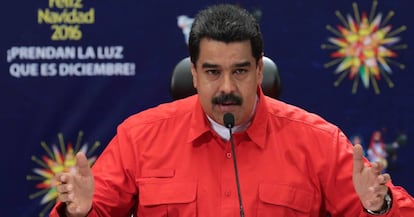Venezuela closes border with Colombia as cash crisis rolls on
Move comes as president introduces higher denomination bills to combat spiraling inflation
President Nicolás Maduro on Monday ordered the closure of Venezuela’s border with Colombia for three days, coinciding with the process of replacing the country’s currency with new, higher denomination bills in a bid to rein in rampant inflation in the South American country. The move comes after the surprise announcement on Sunday to pull the 100-bolívar bill from circulation, which until now had been the country’s largest-denomination bill, but whose value has fallen to less than US$0.05 on the black market.

The country’s central bank said it should begin circulating higher-denomination notes by December 15. The lowest denomination note will be 500 bolívars while the highest will be 20,000 bolívars.
In the meantime, there have been scenes of chaos throughout Venezuela as people try to return 100-bolívar bills to banks. On Monday, people complained that ATMs were not functioning and were unable to accept deposits of 100-bolívar notes. The governor of the state of Táchira, which borders with Colombia in the southeast of the country, said that real estate transactions were frozen until all 100-bolívar notes had been withdrawn from circulation.
Speaking on state television on Monday evening, Maduro said that closing the border was aimed at stopping currency being smuggled out of the country by criminal organizations he accused of destabilizing the economy.
Venezuelans living near Colombia buy pesos to purchase goods unavailable at home due to chronic shortages
Maduro had said that on Sunday night the Venezuelan authorities had seized some 64 million bolívares in 100-bill notes that smugglers were allegedly trying to move into Colombia.
The border between the two countries was reopened in August after a year-long closure following an incident in 2015 when Colombian smugglers wounded three Venezuelan soldiers in a shootout.
Maduro has repeatedly called on Colombia to repeal legislation dating back to 2000 that allows exchange bureaus on the border to set their own exchange rates, independent of those set by the central bank.
On Sunday, Maduro said there were “entire warehouses full of 100-bolivar notes in the [Colombian cities of] Cucuta, Cartagena, Maicao and Buaramanga.”
Maduro said part of the plan was to block any of the 100-bolívar notes from being taken back into the country so the gangs would be unable to exchange bills they had hoarded, making them worthless.
The central bank said higher-denomination notes should circulate by December 15
Many Venezuelans living near the border buy Colombian pesos to purchase goods in Colombia that they cannot get in Venezuela due to severe and chronic shortages.
The Venezuelan bolívar’s value against the Colombian peso on the black market is set by the so-called Dólar Cúcuta.
“We hope that Colombia, of its own free will, repeals this decree, which is damaging a sister nation where 5.5 million Colombians live,” said Maduro in his televised address on Monday night.
He added that the move to withdraw the 100-bolívar notes from circulation was “tough” and “radical”, describing it nonetheless as “inevitable”. He thanked the country’s banks and the “people in general.”
The IMF forecasts Venezuela’s inflation rate for 2016 will be more than 2,000%.
English version by Nick Lyne.
Tu suscripción se está usando en otro dispositivo
¿Quieres añadir otro usuario a tu suscripción?
Si continúas leyendo en este dispositivo, no se podrá leer en el otro.
FlechaTu suscripción se está usando en otro dispositivo y solo puedes acceder a EL PAÍS desde un dispositivo a la vez.
Si quieres compartir tu cuenta, cambia tu suscripción a la modalidad Premium, así podrás añadir otro usuario. Cada uno accederá con su propia cuenta de email, lo que os permitirá personalizar vuestra experiencia en EL PAÍS.
¿Tienes una suscripción de empresa? Accede aquí para contratar más cuentas.
En el caso de no saber quién está usando tu cuenta, te recomendamos cambiar tu contraseña aquí.
Si decides continuar compartiendo tu cuenta, este mensaje se mostrará en tu dispositivo y en el de la otra persona que está usando tu cuenta de forma indefinida, afectando a tu experiencia de lectura. Puedes consultar aquí los términos y condiciones de la suscripción digital.








































